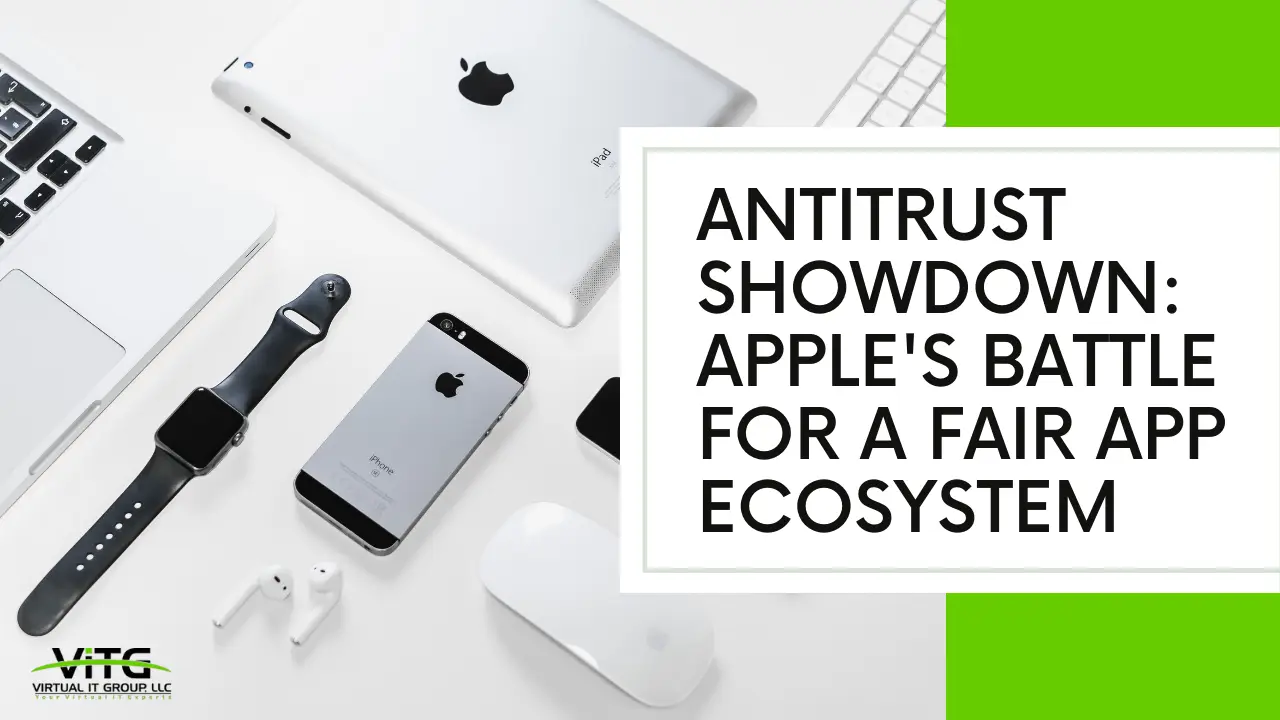The tech world is abuzz with the ongoing legal battle between the U.S. Department of Justice (DOJ) and Apple. The lawsuit, filed in 2021, accuses Apple of stifling competition in the app market through its App Store policies and practices [1]. This article explores the key arguments of the case, its potential implications for Apple and consumers, and the broader landscape of app store regulations.
The DOJ’s Case Against Apple
The DOJ alleges that Apple’s App Store practices create an anti-competitive environment, harming both app developers and consumers. Here are some of the core accusations:
- Monopoly Power: The DOJ argues that Apple wields excessive control over the iOS app distribution process, essentially functioning as a gatekeeper for app developers seeking to reach iPhone and iPad users [1].
- Excessive App Store Fees: Apple charges a 15-30% commission on all in-app purchases and subscriptions, a fee developers must factor into their pricing. The DOJ argues these fees are unreasonably high and stifle innovation.
- Restrictions on Payment Options: Apple requires developers to use its in-app purchase system, preventing them from offering alternative payment methods that could potentially lower costs for consumers [1].
- Anti-Steering Provisions: Apple’s App Store guidelines restrict developers from mentioning alternative app stores or subscription options within their apps, limiting consumer choice.
The DOJ seeks a court order that would force Apple to change its App Store practices, potentially including:
- Allowing Alternative App Stores: This could reshape the iOS app ecosystem by enabling users to download and install apps from competing marketplaces.
- Reduced App Store Fees: Lowering commission rates could benefit both app developers and consumers by potentially leading to more competitive pricing in the App Store.
- Relaxing Payment Restrictions: Granting developers the freedom to offer alternative payment methods within their apps could potentially lead to lower transaction fees for consumers.
Apple’s Defense
Apple maintains that its App Store policies are designed to protect users from security vulnerabilities, malware, and scams. They argue that a curated app store ensures a high-quality user experience and protects user privacy by controlling data collection practices within apps [2]. Additionally, Apple contends that its App Store fees are fair and necessary to maintain the platform and provide valuable services to developers, such as app review, distribution, and marketing tools.
The Potential Impact on Consumers
The outcome of this lawsuit could have significant implications for consumers. Here are some potential scenarios:
- Increased App Choice: If Apple is forced to allow alternative app stores, consumers could benefit from a wider selection of apps that might not have met Apple’s App Store guidelines.
- Lower App Prices: Reduced App Store fees or the ability for developers to offer alternative payment methods could lead to lower in-app purchase costs and subscription fees.
- Potential Security Concerns: Opening the door to alternative app stores might introduce some security risks, as Apple would no longer have complete control over app distribution. However, robust security measures implemented by competing app stores could mitigate this concern.
The Broader Landscape of App Store Regulations

pexels pixabay 38544
This lawsuit is part of a larger conversation about app store regulations. Other countries, including South Korea and the European Union, have passed laws aimed at curbing the power of major app store operators like Apple and Google [3, 4]. The outcome of the DOJ case could have a ripple effect, potentially influencing app store regulations worldwide.
The Road Ahead
The legal battle between the DOJ and Apple is complex and could take years to resolve. The court will ultimately decide whether Apple’s App Store practices violate antitrust laws. Regardless of the outcome, this case has sparked a crucial debate about competition, user privacy, and the future of app distribution.
Looking Beyond the Lawsuit: Building a More Secure App Ecosystem
While the legal battle focuses on competition, it’s important to remember the importance of cybersecurity in the app ecosystem. Virtual IT Group offers a range of mobile device management (MDM) solutions that can help businesses secure their corporate data while allowing employees to access necessary apps. These solutions can help ensure that only authorized apps are installed on company devices and that sensitive data is protected.

